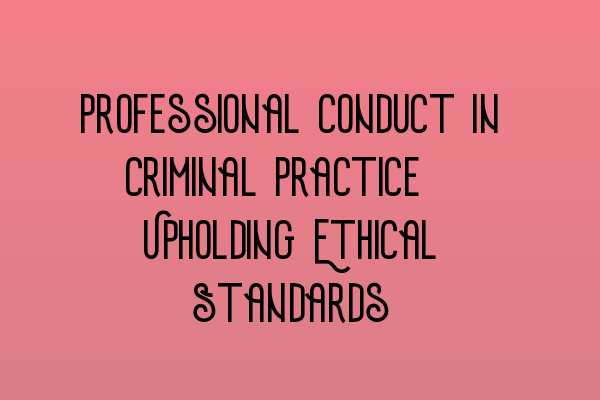Professional Conduct in Criminal Practice: Upholding Ethical Standards
As criminal practitioners, we have a crucial role in upholding ethical standards to ensure the integrity of the criminal justice system. Upholding professional conduct not only strengthens our reputation as legal professionals but also maintains the public’s trust in the legal profession. In this blog post, we will discuss the importance of ethical standards in criminal practice and explore the key principles that guide our conduct.
Importance of Ethical Standards in Criminal Practice
Adhering to ethical standards is paramount in criminal practice due to the nature and impact of criminal cases on individuals’ lives and society as a whole. Engaging in unethical behavior erodes the trust and confidence the public places in us as legal professionals. By maintaining high ethical standards, we can ensure that justice is served, and the rights of our clients are protected.
Key Principles Guiding Professional Conduct
Let’s delve into the key principles that are at the core of professional conduct in criminal practice.
Integrity
Integrity is the foundation of our profession. We must uphold the highest standards of honesty, fairness, and ethical behavior. This means acting in the best interests of our clients while also respecting the rights and welfare of all parties involved in the criminal justice process.
Integrating integrity into our practice ensures that we act as trusted advisors, providing accurate and reliable legal advice to our clients. It also means presenting evidence truthfully, even if it may harm our client’s case. Upholding integrity strengthens the credibility of the legal system and promotes confidence in our profession.
Confidentiality
Confidentiality is a crucial aspect of legal practice. We have a duty to maintain client confidentiality, ensuring that privileged information shared with us remains protected. Our clients must feel confident that anything they disclose to us will remain confidential.
By respecting the confidentiality of our clients, we create an environment of trust, enabling clients to provide us with all relevant information necessary for their defense. This principle also extends to not discussing case details with unauthorized individuals and maintaining confidentiality even after the case concludes.
Impartiality
Impartiality is central to the administration of justice. As criminal practitioners, we must approach each case objectively and without bias. Treating all parties involved with fairness and respect is essential in ensuring the integrity and credibility of the legal system.
Remaining impartial means considering the interests and rights of all parties involved, including victims, witnesses, and defendants. It also involves avoiding conflicts of interest that could compromise our ability to provide diligent and unbiased representation.
Competence
Competence is a fundamental requirement in criminal practice. We have a responsibility to maintain and improve our legal knowledge and skills to provide effective representation to our clients. Staying abreast of the latest developments in criminal law and procedure is crucial for upholding our duty to act in our clients’ best interests.
Continuing professional development through courses, training, and staying informed about changes in legislation and case law is essential. By enhancing our competence, we can provide competent and effective legal services to our clients, leading to better outcomes in their cases.
Continual Adherence to Ethical Standards
Adhering to ethical standards is not a one-time endeavor but a continual commitment throughout our legal careers. We must regularly evaluate our practices and ensure that we are upholding the highest ethical standards. Regularly reviewing and updating our ethical knowledge and self-reflecting on our conduct can help us identify areas for improvement.
As legal professionals, we have a duty to maintain public confidence in our profession. Upholding ethical standards not only safeguards our own reputations but also contributes to a fair and just criminal justice system.
For further resources on legal practice and preparation for the SQE exams, you can explore the following related articles:
- SQE 1 Practice Exam Questions
- SQE 1 Practice Mocks FLK1 FLK2
- SQE 2 Preparation Courses
- SQE 1 Preparation Courses
- SRA SQE Exam Dates
Remember, by upholding ethical standards, we contribute to the integrity and fairness of the criminal justice system. Let us strive to be ethical practitioners, committed to the highest standards of professionalism in our criminal practice.
